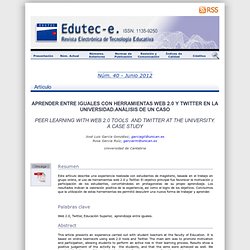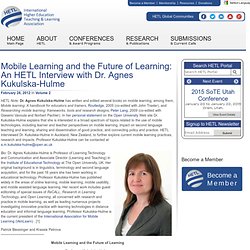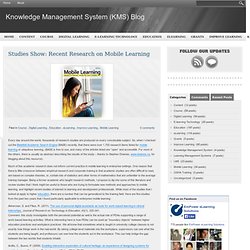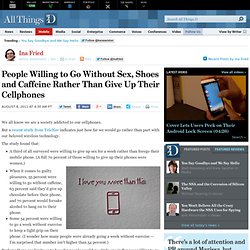

Edutec-e. Revista Electrónica de Tecnología Educativa. Este artículo describe una experiencia realizada con estudiantes de magisterio, basada en el trabajo en grupo online, el uso de herramientas web 2.0 y Twitter.

El objetivo principal fue favorecer la motivación y participación de los estudiantes, convirtiéndoles en protagonistas de su propio aprendizaje. Los resultados indican la valoración positiva de la experiencia, así como el logro de los objetivos. Concluimos que la utilización de estas herramientas les permitió descubrir una nueva forma de trabajar y aprender. The influence of Mobile Phones on Student Autonomy. The Current State Of Mobile Learning In Education. How many students are projected to use mobile devices by the year 2016? How many are using devices while learning right now? How much is spent every year on textbooks? We now know the staggering results of these and other questions thanks to a report from T-Mobile .
They showcased a handful of schools who are deploying devices and connected learning as part of a recent gathering in Washington, D.C. After examining the below infographic, the highlighted school initiatives, and the report from T-Mobile, it becomes clear that mobile learning is more than just the future. Key Takeaways Every student is going to be using mobile learning by the year 2016 The biggest issue right now is bandwidth. What Technology Deployers Are Saying. Mobile Learning and the Future of Learning: An HETL Interview with Dr. Agnes Kukulska-Hulme. February 28, 2012 in Volume 2 HETL Note: Dr.

Agnes Kukulska-Hulme has written and edited several books on mobile learning, among them, Mobile learning: A handbook for educators and trainers, Routledge, 2005 (co-edited with John Traxler), and Researching mobile learning: frameworks, tools and research designs, Peter Lang, 2009 (co-edited with Giasemi Vavoula and Norbert Pachler). In her personal statement on the Open University Web site Dr. Kukulska-Hulme explains that she is interested in a broad spectrum of topics related to the use of mobile technologies, including learner and teacher perspectives on mobile learning, impact on second language teaching and learning, sharing and dissemination of good practice, and connecting policy and practice. HETL interviewed Dr. Bio: Dr. Patrick Blessinger and Krassie Petrova ~~~~~~~~~~~~~~~~~~~~~~ Mobile Learning and the Future of Learning Dr. The Open University, UK HETL: Dr. HETL: Dr. HETL: Dr. AKH: Students have to show us the way.
Studies Show: Recent Research on Mobile Learning. Every day around the world, thousands of research studies are produced on every conceivable subject.

So, when I checked out the Bielefeld Academic Search Engine (BASE) recently, that there were over 1,700 research items listed for mobile learning or ubiquitous learning. (BASE is free to use, and many of the articles listed are “open” and accessible. For most of the others, there is usually an abstract describing the results of the study – thanks to Stephen Downes, www.downes.ca, for blogging about this resource). Much of this academic research does not inform current practice in mobile learning in enterprise settings. One reason that there is little crossover between empirical research and corporate training is that academic studies are often difficult to read, are based on complex theories, or, contain lots of statistics and other forms of mathematics that are unfamiliar to the average training manager.
Akkerman, S. and Filius, R. (2011). One in Five Would Go Shoeless Rather Than Part With Their Cellphones - Ina Fried - Mobile. We all know we are a society addicted to our cellphones.

But a recent study from TeleNav indicates just how far we would go rather than part with our beloved wireless technology. The study found that: A third of all surveyed were willing to give up sex for a week rather than forego their mobile phone. (A full 70 percent of those willing to give up their phones were women.) When it comes to guilty pleasures, 55 percent were willing to go without caffeine, 63 percent said they’d give up chocolate before their phone, and 70 percent would forsake alcohol to hang on to their phone. Perhaps there are limits as to how far people would go: Only one in five was willing to go shoeless rather than phoneless.
Some 22 percent of smartphone owners said they would rather go a week without seeing their significant other than without checking their apps. Only 14 percent of feature phone owners felt similarly. Studies Show: Recent Research on Mobile Learning.